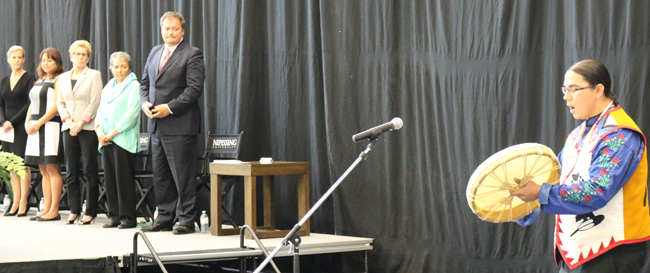Royal visit addresses language, education and treaties

By Marci Becking
NORTH BAY – Language teacher Tory Fisher and Princess Edward, Countess of Wessex agreed on one thing for sure at last week’s event at Nipissing University – that language is what defines us as a people.
“[Language] is a part of our history and who we are – especially within communities where language has not been documented, but passed from generation to generation verbally,” said the Countess to an audience of dignitaries, educators and students. “Technology can help to support and strengthen these languages, offering young people living in their communities as well as in cities and abroad, a chance to retain their native tongue. Education is a fundamental right for all young people.”
Fisher, who teaches Anishinaabemowin as a second language to Grade 1-8 students at St. Alexander’s and Mother St. Bride schools in North Bay says that he’s happy to be teaching and proud that he can bring culture to children who might never be exposed to it in an urban setting.
“Growing up my mentor was language teacher Muriel Sawyer. I also had friends like Blair Beaucage and I thought it was cool that he could speak the language,” said Fisher who is a citizen of Nipissing First Nation, alum of Nbisiing Secondary and obtained his Bachelor of Education from Nipissing University. “We were in the drum group ‘Little Iron’ together. I remember speaking with the Elders of my community and they told me that if I learn about the culture and the language, I will be able to get a job.”
Fisher teaches Anishinaabemowin to 40 students in each school – the primary grades receive 100 minutes of class and the older students receive 200 minutes.
“I smudge in my class,” said Fisher. “Sometimes kids will be having a bad day and will come and ask for a smudge at recess.”
Nipissing First Nation Chief Marianna Couchie welcomed the Countess of Wessex to Nipissing Territory and spoke about how most people have the concept of treaty rights backwards.
“Treaties are living documents,” said Chief Couchie. “Most people think that we are the ones with the treaty rights. In fact, we gave the settlers treaty rights. We need to honour those treaties.”
Ontario Premier Kathleen Wynne agreed with Chief Couchie – she acknowledged both the Nipissing First Nation traditional territory and the Robinson Huron Treaty. She emphasized the need for partnership between the federal, provincial and First Nation governments.
“Government to government to government discussions have to take place based on the treaties,” said Premier Wynne.


